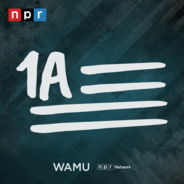We've heard about a lot of them the last few weeks. They're one powerful tool in a commander-in-chief's arsenal to enact their agenda.Donald Trump has made heavy use of the executive order in the past few weeks, but so have his predecessors. Both Joe Biden and Barack Obama issued many Executive Orders during their times in office.We discuss the practice and boundaries of Executive Orders. Want to support 1A? Give to your local public radio station and subscribe to this podcast. Have questions? Connect with us. Listen to 1A sponsor-free by signing up for 1A+ at plus.npr.org/the1a.Learn more about sponsor message choices: podcastchoices.com/adchoicesNPR Privacy Policy

Nachrichten
1A Folgen
Listening to the news can feel like a journey. But 1A guides you beyond the headlines – and cuts through the noise. Let's get to the heart of the story, together – on 1A.Support NPR and get your news sponsor-free with 1A+. Learn more at plus.npr.org/the1a
Folgen von 1A
299 Folgen
-
Folge vom 17.02.2025The Story Behind Executive Orders
-
Folge vom 14.02.2025The News Roundup For February 14, 2025The White House is moving ahead with its plan to significantly reduce the federal workforce.Also this week, Robert F. Kennedy Jr was confirmed as the Secretary for Health and Human Services in a 52-48 vote, even after several senators raised concerns about his record of an anti-vaccine activism.And in global news, Donald Trump spent time on the phone with both Russian President Vladimir Putin and Ukrainian President Volodymyr Zelenskyy, and hopes negotiations to end the war will begin immediately. The ceasefire deal between Israel and Hamas came under strain this week as Hamas announced that it would delay the release of three hostages in Gaza on Saturday in exchange for more Palestinian prisoners being held in Israel.We discuss all this and more during the News Roundup.Want to support 1A? Give to your local public radio station and subscribe to this podcast. Have questions? Connect with us. Listen to 1A sponsor-free by signing up for 1A+ at plus.npr.org/the1a.Learn more about sponsor message choices: podcastchoices.com/adchoicesNPR Privacy Policy
-
Folge vom 13.02.2025Donald Trump And Diversity, Equity, And InclusionAs of Tuesday, President Donald Trump has signed seven executive orders or proclamations related to DEI. They include ending virtually all such programs in the federal government, calling them "illegal," and "Ending racial indoctrination in K through 12 schooling." According to the Trump administration, that includes teaching "gender ideology and critical race theory" in the classroom.A number of private companies and institutions are following suit. Target, Google, Meta, Goldman Sachs, Deloitte, and PBS are just a few now changing or eliminating their DEI initiatives following Trump's orders.We explore what DEI actually means, and what happens when we just get rid of it.Want to support 1A? Give to your local public radio station and subscribe to this podcast. Have questions? Connect with us. Listen to 1A sponsor-free by signing up for 1A+ at plus.npr.org/the1a.Learn more about sponsor message choices: podcastchoices.com/adchoicesNPR Privacy Policy
-
Folge vom 13.02.2025Strangers Share Their Love Stories With Author Trent DaltonIn 2021, Trent Dalton sat down with a typewriter on a busy corner in Brisbane, Australia, and asked people to tell him their love stories. Those tales are now collected in his first book, "Love Stories." It's over 300 pages and talks about the meaning of love, from strangers and Dalton alike.As a nod to Valentine's Day, we revisit our conversation with Dalton about his book "Love Stories." We discuss what it means to know love and talk and how to talk about it with strangers. Want to support 1A? Give to your local public radio station and subscribe to this podcast. Have questions? Connect with us. Listen to 1A sponsor-free by signing up for 1A+ at plus.npr.org/the1a.Learn more about sponsor message choices: podcastchoices.com/adchoicesNPR Privacy Policy
